CCARDESA, AICCRA, and ASARECA Strengthen the Capacities of CSA Experts in Eastern and Southern Africa
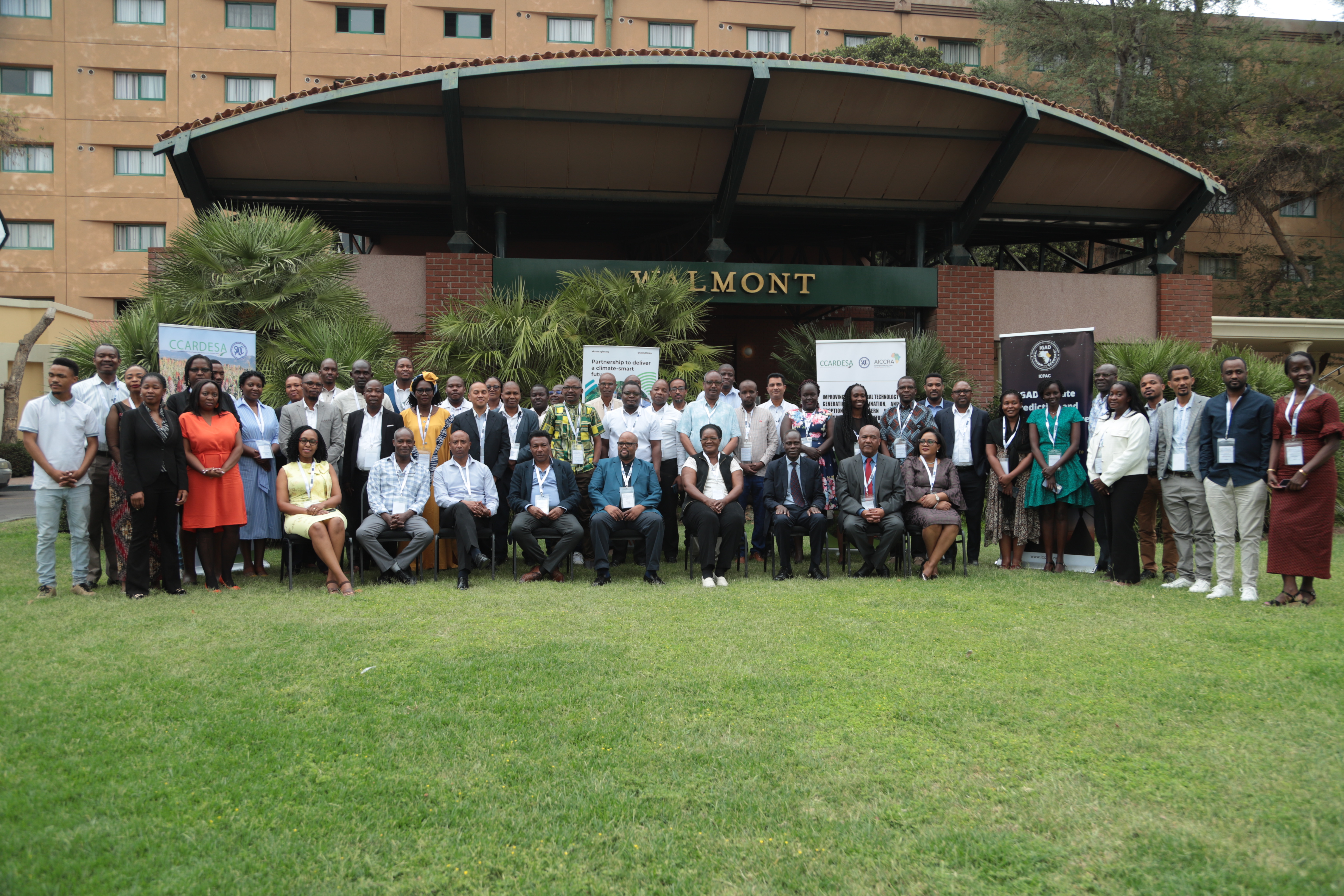
By Genevieve Apio, Bridget Kakuwa-Kasongamulilo, and Brook Tsefaye
Gaborone, Botswana – From September 16 to 20, 2024, a pivotal capacity-building training workshop was held at The Grand Palm Hotel in Gaborone - Botswana, aimed at enhancing the skills of agricultural experts in Southern and Eastern Africa in the face of escalating climate change challenges. Organized by the Accelerated Impacts of CGIAR Climate Research for Africa (AICCRA) in collaboration with the IGAD Climate Prediction and Application Center (ICPAC), in partnership with ASARECA and CCARDESA, the workshop addressed the pressing challenges posed by climate variability, emphasizing the critical need for generation and use of reliable climate information and promotion of climate-smart agriculture (CSA).
This initiative represents a crucial step towards building adaptive capacity and fostering sustainable development in response to the climate challenges facing Southern and Eastern Africa. According to the Intergovernmental Panel on Climate Change (IPCC), these areas have been experiencing more frequent and intense weather events, including droughts and floods, jeopardizing food security and livelihoods.
In his opening remarks, Prof. Cliff Dlamini, Executive Director of CCARDESA, emphasized the critical role of Climate-Smart Agriculture (CSA) in achieving sustainable development. "CSA is a key component of the Sustainable Development Goals (SDGs) and other global frameworks," he stated, highlighting its alignment with international efforts to combat climate change. Prof. Dlamini stressed the importance of informed decision-making: "Access to critical information is essential as it empowers individuals to make impactful and effective decisions. “He also underscored the importance of gender inclusivity in CSA, pointing out that "Gender is not just about women, but includes both men and women. However, given the vulnerability of women and the significant proportion of women and youth in our population, we must ensure they are prioritized in such training workshops and future interventions."Prof. Dlamini noted the potential for misinterpreting hazards due to poor climate conditions and inadequate planning in disaster risk management. "Some hazards are mistakenly perceived as inevitable when, in reality, they stem from poor planning. We must develop strategies to mitigate these risks," he urged the delegates.
He also emphasized the collaborative efforts of CCARDESA, ASARECA, and CGIAR in addressing climate change. "Through this partnership, I am hopeful that the capacity of participants will be enhanced, equipping them to tackle climate change through both mitigation and adaptation strategies," Prof. Dlamini said.
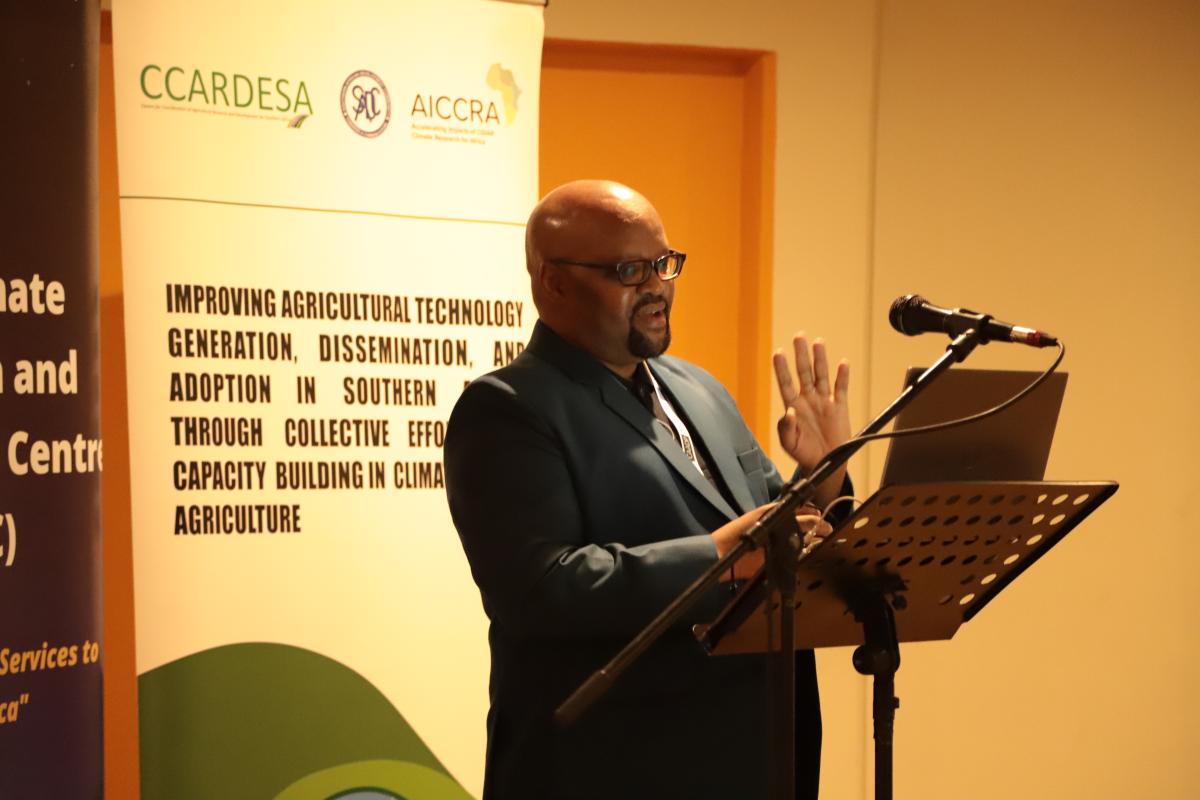
Prof. Cliff Dlamini-CCARDESA Executive Director
Dr Charity. K Kruger, Executive Director of Botswana's National Agricultural Research Development Institute (NARDI), began her remarks by warmly welcoming participants in the host country. She noted that "climate issues cannot be overemphasized." She commended the workshop organizers for their timely focus on this critical challenge. Dr. Kruger highlighted the dynamic nature of climate change, stressing the importance of building the capacity of all stakeholders to tackle its various impacts. "We must ensure that we facilitate learning across all sectors," she added, reinforcing the need for collective action in adapting to the evolving climate landscape.
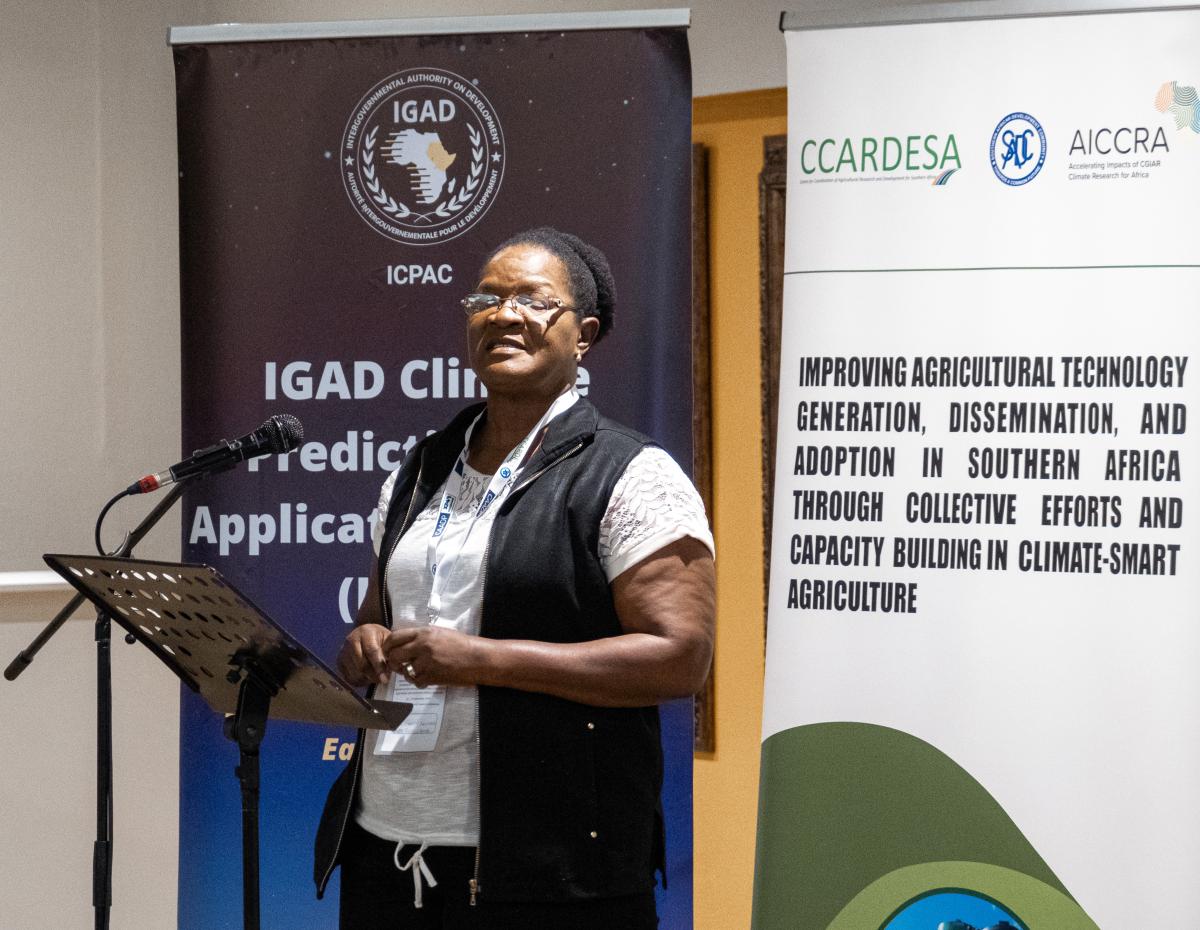
Dr. Charity K. Kruger, Executive Director of the National Agriculture Research Development Institute (NARDI)
Mr. Moses Odeke, Acting Head of Programmes at ASARECA, highlighted the escalating seriousness of climate change, calling it a "climate crisis" that has triggered a "vicious cycle of vulnerability," making it increasingly difficult for communities to recover. "Vulnerable groups, including children, women, and the elderly, have borne the brunt of this crisis," he emphasized, drawing attention to the disproportionate impact on these populations.

Mr. Moses Odeke, Acting Head of Programmes, ASARECA
Mr. Odeke noted that countries in Eastern and Southern Africa are particularly vulnerable, with many already experiencing significant consequences of climate change. "The impacts are already being felt across the region, from droughts to floods, heat waves, and tropical cyclones," he said, pointing out that these climate hazards have severe implications for agriculture, economic growth, and development.
Referring to key frameworks like the SADC Resilience Framework 2020-2030, Mr Odeke added, "This framework confirms that the primary climate hazards we face—drought, floods, tropical cyclones, and heat waves—severely affect food security and livelihoods." He emphasized the urgency of addressing these challenges to protect the region’s future, noting that "climate change has already dealt a major blow to agriculture, economic growth, and overall development."
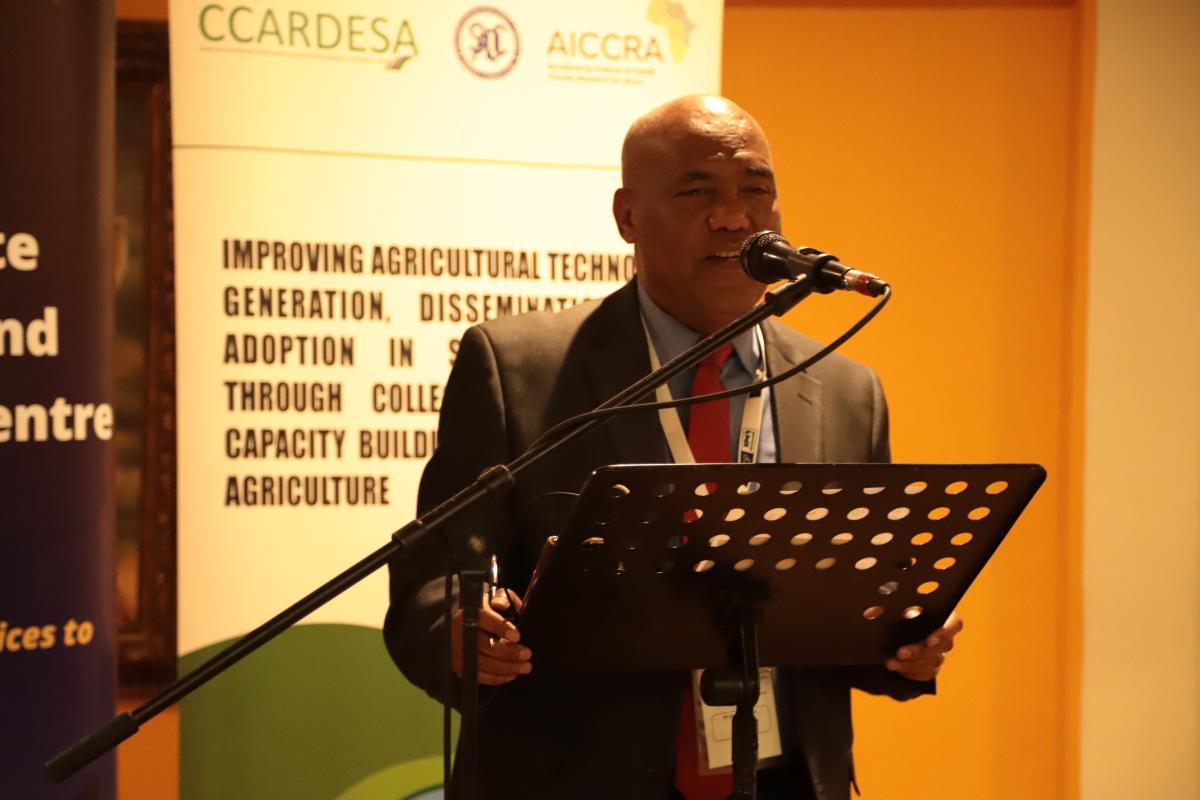
Dr. Abebe Tadege, Climate Change Officer at IGAD Climate Prediction and Application Center (ICPAC)
Addressing participants at the workshop, Dr. Abebe Tadege, the Climate Change Officer at IGAD Climate Prediction and Application Center (ICPAC), emphasized the importance of raising awareness as a first step in negotiating climate change agreements. "When negotiating climate change agreements, it is crucial to start by increasing awareness of the issues at hand," Dr. Tadege stated, stressing the need for a solid understanding of the challenges posed by climate change.
He highlighted the regions of Eastern and Southern Africa as being particularly well-suited for collaboration in tackling climate change. "These regions are ideal for cooperation, especially in developing effective climate services to bolster resilience and support adaptation efforts," he said. Dr. Tadege also underscored the role of ICPAC in sharing its experiences to advance climate action. "With ICPAC's extensive presence in the region, we are well-positioned to share invaluable experiences in this field," he remarked, reaffirming the organization's commitment to fostering regional cooperation in climate resilience.
Dr. Dawit Solomon, AICCRA Regional Program Manager Eastern, and Southern Africa welcomed delegates to the training and acknowledged IGAD, SADC, and the World Bank IDA Fund for their invaluable support in making this event possible.
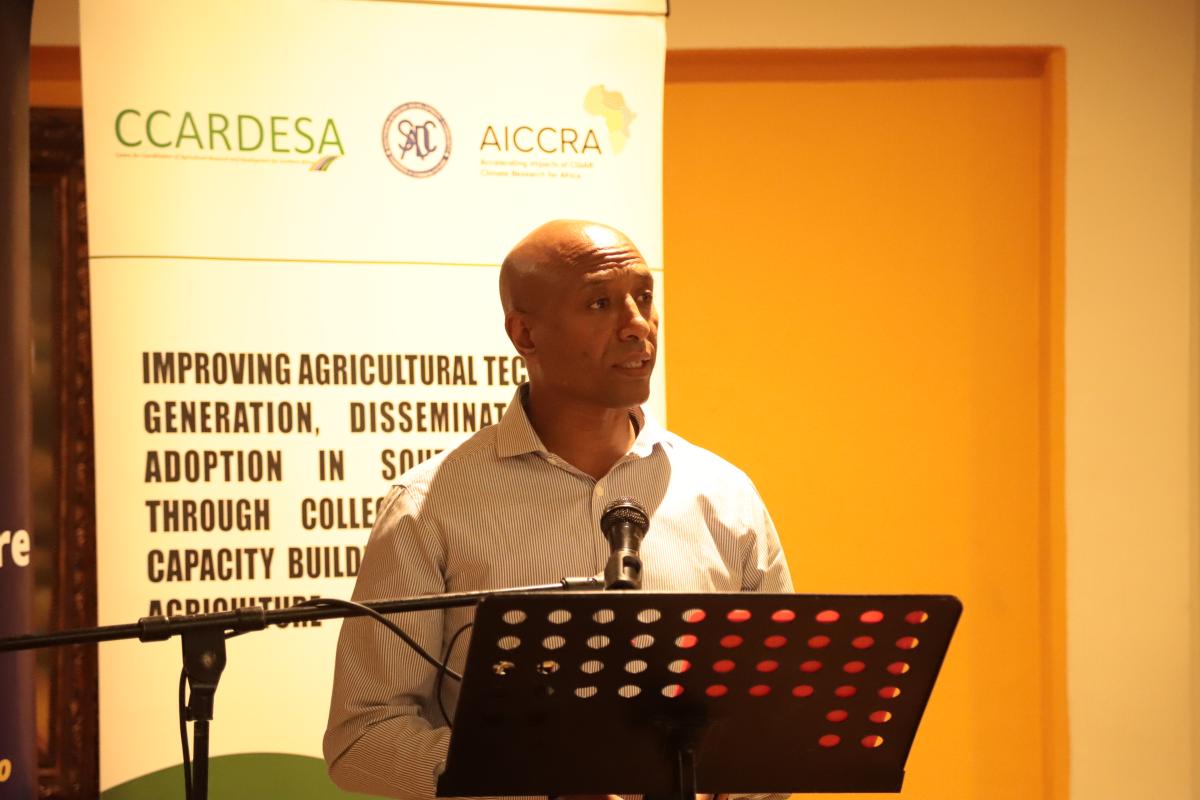 Dr. Dawit Solomon, —AICCRA Regional Program Manager Eastern and Southern Africa
Dr. Dawit Solomon, —AICCRA Regional Program Manager Eastern and Southern Africa
The workshop focused on several critical areas, including climate basics, climate information services, early warning systems, disaster management, and the impacts of climate change on agriculture and gender. Participants not only gained foundational knowledge but also acquired practical skills to interpret and apply climate information effectively. This will enable them to make informed agricultural planning and management decisions, essential for regions increasingly vulnerable to climate unpredictability. This initiative was relevant as agriculture in Southern and Eastern Africa is predominantly rain-fed, making it highly susceptible to climate fluctuations. The enhanced capacity of agricultural experts is crucial in fostering sustainable development and improving regional food security.
Dr. Baitsi Podisi, CAADP-XP4 Coordinator, delivered the closing remarks on behalf of CCARDESA. He expressed gratitude to the facilitators and partners for their dedication and contributions to the training. Dr. Podisi emphasized the importance of the available climate change research, highlighting its connections to regional initiatives and the need to align these efforts with the needs of local communities.
Participants included agricultural officers, researchers, academics, and policymakers who engaged in a dynamic mix of lectures, interactive sessions, and group discussions. Using digital tools and online platforms enriched the learning experience, making the content more accessible and practical.
The workshop's expected outcomes are far-reaching. Agricultural experts are expected to have a stronger grasp of climate change, leading to an increased use of climate information services and greater implementation of early warning systems and climate risk management strategies.
This training workshop, spearheaded by AICCRA, CCARDESA, and ASARECA, underscores the importance of building adaptive capacity in the face of climate change, a priority emphasized by the United Nations Framework Convention on Climate Change (UNFCCC). The workshop aimed to empower experts to drive sustainable agricultural policies and practices safeguarding food security and community well-being in Southern and Eastern Africa by bridging the gap between scientific research and on-the-ground application.























































